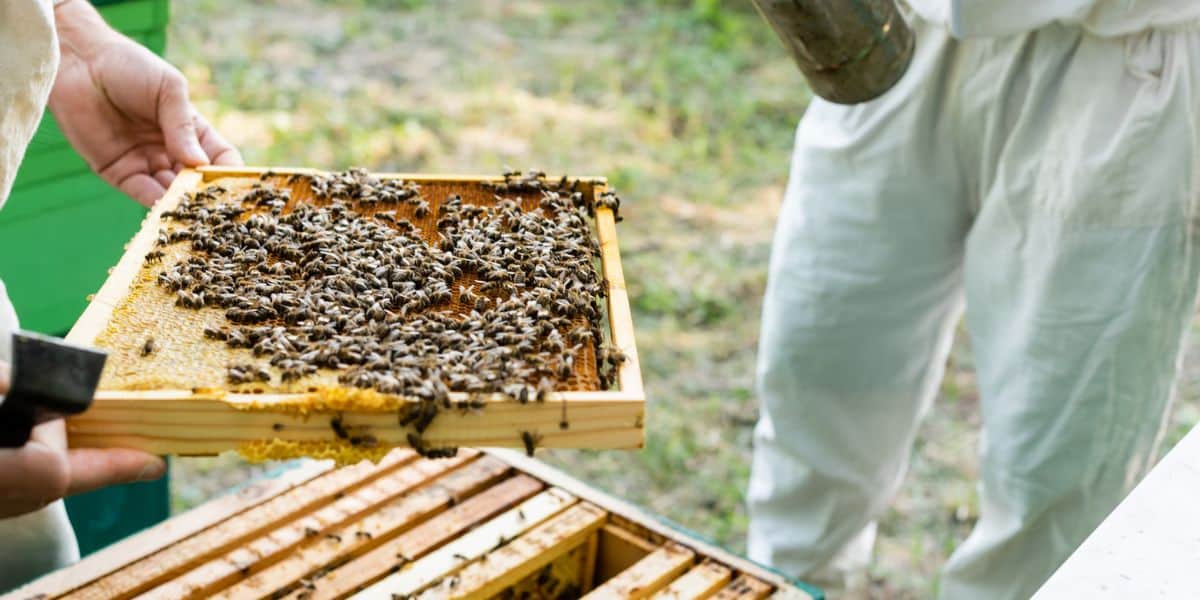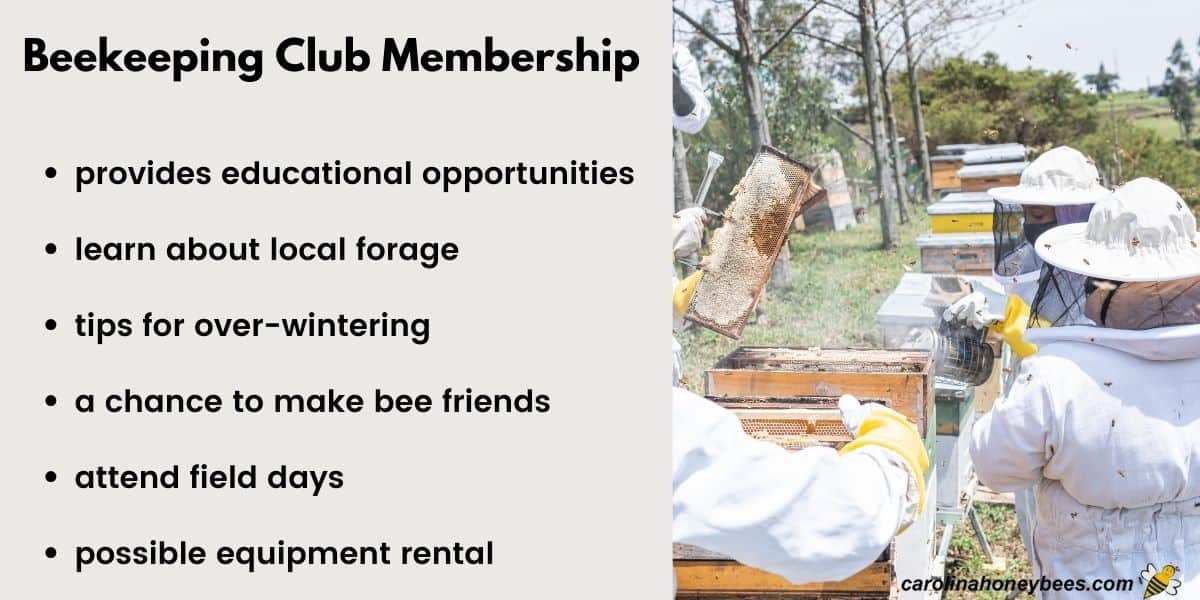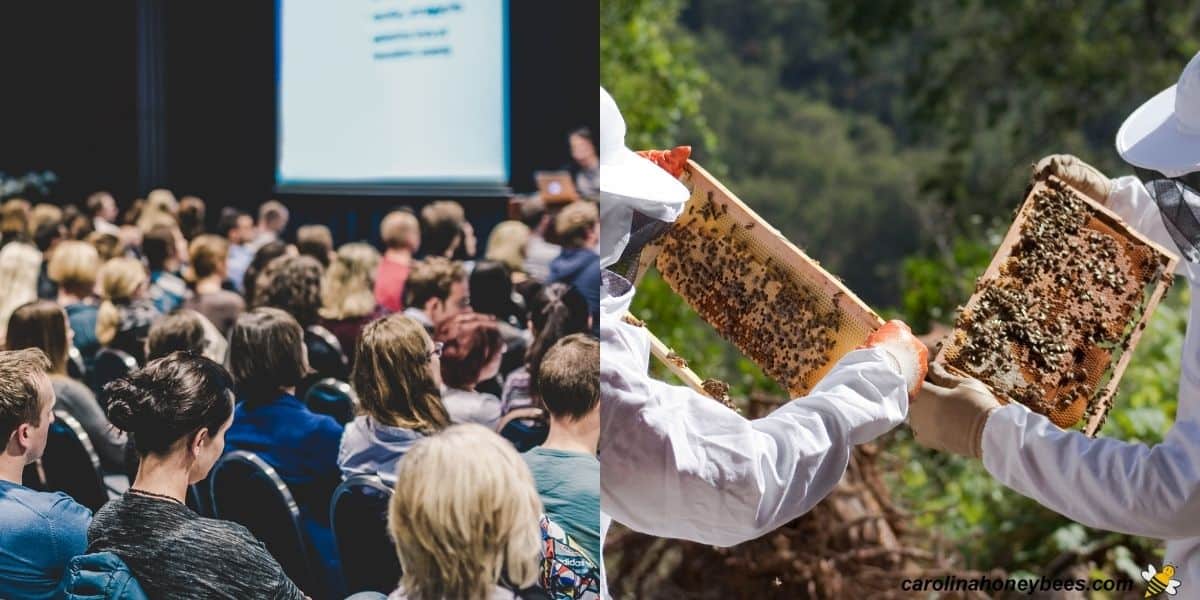Local Beekeeping Associations
Learning from others with more experience is a valuable resource in beekeeping. And the opportunity to learn from folks in your local area – priceless. This is the reason new beekeepers should always reach out to their local beekeeping associations or bee clubs. The members will know more about your weather and foraging conditions than anyone. Let’s explore what they are and what they do – including why you may want to consider joining.

My journey to becoming a Master Beekeeper began at a small local bee club. For those wishing to learn how to start keeping bees, all the terminology and suggestions may be a bit overwhelming at first. One of the easiest ways to find local beekeepers is to attend club meetings.
What is a Beekeeping Association?
A beekeeping association is a group of beekeepers that come together to share their knowledge and expertise on all things related to keeping honey bees.
It may be a highly organized group with local, state and regional branches. Or, perhaps it is just a small group of local experienced beekeepers that want to get together and share experiences. And, in my area, we usually eat some good food too!
Club Size Does Not Indicate Value
The size of a local beekeeping association can vary greatly. Some boast thousands of members that pay dues to help support the activities of the club. These groups may hold meetings twice a month or more.
In rural areas, bee clubs tend to be much smaller. A local group may consist of a smaller group of 5-10 friends.
Perhaps they meet once a month or less. But, they are no less passionate about bees and offer valuable information for beginners.

Benefits of Beekeeper Association Membership
Beekeeping associations have the “people power” and sometimes the money to host a variety of activities.
Often, you don’t even have to be a member of the bee club to participate. But, it is good to pay the usually low cost membership and support your club.
The exact programs vary but some common examples of activities are:
- provide education and training
- allow members access to rental equipment
- combine Spring orders for bees
- mentor programs
- field trips and apiary visits
- community building
- advocacy for bees
Education
Some local beekeeping associations hold classes to train new beekeepers each year. These are very valuable – I know I used to help teach. They are usually held in late Winter (when the instructors are not busy with their own hives).
These low cost classes are a great way to learn exactly what is involved in keeping honey bees. Sometimes, participants see the work involved and decide that hobby beekeeping is not right for them at this time. That’s okay.
If you are lucky enough to have the resources, your association may be able to host special education days at the apiary of a member. These hands-on opportunities in the bee yard give you a chance to learn from the question that others ask.
Equipment Rentals
Another compelling reason to join your local bee club may be equipment rentals. The cost of beekeeping can be rather daunting.
Your club may allow members to rent expensive tools such as honey extractors or even oxalic acid vaporizers for a very small fee. Our local association of beekeepers did this for years and it was very beneficial to new members.
Order Bees in Bulk
Local clubs in my area often take order from members wanting to buy honey bees. Then, one person goes to the supplier and picks up the club order. This can mean a savings for the members who get a better price by buying in bulk.
Mentoring Programs
If your association has a mentor program, you are very lucky indeed. The way this usually works is some of the senior members promise to serve as helpers to new beekeepers. It is a great way to get some hands-on training.
However, it is not uncommon for mentor burn-out to happen. For the program to work well, the association needs a good supply of willing participants.
Field Days
You may enjoy the opportunity to participate in various “bee day” events put on by your bee club. Members are invited to a meeting at the apiary of another beekeeper. The lecture or program is often followed by a visit to the hives.
Show up with your protective beekeeper clothing and get a chance to observe inside the hives of someone else’s bees. A great learning experience.
Sense of Community
From monthly meetings, to annual picnics and Christmas parties, beekeeping associations give us a chance to join with others of like minds.
Finding friends that share your passion for bees is wonderful and who knows, you may need some help with your hives someday. Who you gonna call?
Bee Advocacy
Advocacy, is just a fancy word for promoting the honey bee and those of us who manage them, advocacy efforts help the public understand the importance of honey bees.
One example is sponsoring a booth at the state fair. Members often “man” these events, teach others about honey bees and may be given the opportunity to sell honey from their hives.
Local Bee Clubs Teach You
In general, at each meeting a small program is presented on a variety of topics important to beekeepers. Sometimes, you will enjoy a guest speaker. There is also a time to ask questions about any problems you may be having with your hives.
You also learn:
- about bee forage or bee plants in your area
- local climate issues that affect bees
- when is the nectar or honey flow
- what do you need to know about winter beekeeping in the area

How to Find Beekeepers Near You
One of the easiest ways to find local beekeepers is to ask. Of course, today many folks ask Google. But ,if it doesn’t yield the results you want – ask at the local garden center or farm supply.
Another good way to find beekeepers near you is to start with the regional associations. They can then direct you to each state bee association.
State groups keep the contact information for local clubs. Because the local groups are ran by volunteers – the contact information changes more frequently.
Regional Beekeeping Associations
National Groups
Another great resource for beekeepers are the groups that focus on bees and/or honey across the United States. These organizations offer many educational opportunities for members and the public at large.
FAQs
To find the nearest bee club – ask. Each state has a state beekeeping association with local information. A local extension office is another good place to start.
In most cases, visitors are always welcomed to attend bee club meetings. Some perks may be limited to members only though – such as winning door prizes.
Of course not, you can attend any beekeeping association meeting that fits you.
A Final Word
Being a member of a beekeeping club has definite benefits. I have made some lifelong friends at various clubs-that I will never forget. And, some I would like to forget (and they likely feel the same way about me – so that’s okay). Is every bee club great? No. They are made up of people with a variety of personalities and agendas. Not every group will be your people – find one that you like and feel comfortable joining.

